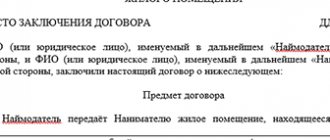Today, the issue of terminating a social tenancy agreement is particularly relevant. Articles 83 - 85 of the Housing Code of the Russian Federation regulate the process of terminating a social tenancy agreement and regulating the eviction of citizens from residential premises provided under such an agreement. In this article, we will consider whether it is possible to terminate a social tenancy agreement unilaterally, what grounds and documents are needed for this, and we will also analyze the legal consequences of this procedure for both parties.
Unilateral termination of a social tenancy agreement: legal grounds
Termination of a social tenancy agreement unilaterally
You can terminate a social tenancy agreement for residential premises at any time by agreement of both parties.
The tenant has the right to terminate such an agreement at any time, having the written consent of all those living with him in this premises. If the tenant has found another place to live, then the date of termination of the social tenancy agreement is the date of departure .
However, if the initiative to terminate the contract rests with the landlord and the parties fail to agree peacefully on eviction, then the landlord needs to put forward certain requirements for eviction, namely:
- failure to pay rent for accommodation in the premises and utilities for six months;
- systematic, repeated violations of the rights and legitimate interests of neighbors, constantly receiving complaints from them;
- illegal redevelopment of premises;
- use of residential premises for other purposes, organization of an office, workshop in the apartment, etc.;
- destruction and mismanagement of housing;
- violation of sanitary, technical and fire safety standards;
- the presence of a commission decision on the emergency condition of the building or whether it is subject to demolition.
A social tenancy agreement may be terminated due to the death of a single tenant.
Let's look at an example . Lonely pensioner Petrenko Yu.V. On September 20, 2006, he entered into a social rental agreement for an apartment with the local administration, paid rent and utility bills on time, kept the premises clean, and did not conflict with neighbors. On May 17, 2017, the tenant died of a heart attack. From this date, the social tenancy agreement ceased to be valid.
The procedure for termination at the initiative of the lessor
Termination of a social tenancy agreement in connection with the decision of the landlord is carried out in compliance with the following steps given in the table.
| Stages | Name of procedure | Description |
| 1 | Collect sufficient grounds for termination of the contract | Only one reason from the list above is enough for the landlord to have the right to decide to terminate the social tenancy agreement unilaterally |
| 2 | Notifying the tenant of the desire to terminate the contract | Employers must communicate their decision in person, orally or in writing. Provide time to search for new housing, or perhaps offer an alternative |
| 3 | Refusal to evict | In such a situation, you need to begin collecting evidence confirming the landlord’s grounds for terminating the rental agreement. |
| 4 | Going to court | Next, with all the necessary list of documents and evidence, you must file a statement of claim in court. |
Failure to pay rent for housing is considered for a period of six months. When the contract is concluded for a short-term period, it is enough not to pay payments for two months in a row.
Article 79 of the Housing Code of the Russian Federation
In content Article 79. Termination and termination of the sublease agreement for residential premises provided under a social tenancy agreement 1. The sublease agreement for residential premises provided under a social tenancy agreement is terminated upon the expiration of the period for which it was concluded. 2. Upon termination of a social tenancy agreement for residential premises, the sublease agreement for such residential premises shall be terminated. 3. A sublease agreement for residential premises provided under a social tenancy agreement may be terminated: 1) by agreement of the parties; 2) if the subtenant fails to comply with the terms of the residential sublease agreement. 4. In the event that a subtenant of residential premises provided under a social tenancy agreement, or a citizen for whose actions this subtenant is responsible, uses this residential premises for other purposes, systematically violates the rights and legitimate interests of neighbors or mismanages the residential premises, allowing it destruction, the tenant of the residential premises has the right to warn the subtenant about the need to eliminate the violations. If these violations entail the destruction of the residential premises, the tenant of the residential premises also has the right to assign this subtenant a reasonable period of time to carry out repairs to the residential premises. If the subtenant or a citizen for whose actions this subtenant is responsible, after warning the tenant, continues to violate the rights and legitimate interests of neighbors or use the residential premises for other purposes or fails to carry out the necessary repairs without good reason, the tenant has the right to terminate the residential sublease agreement in court. premises and evict the subtenant and citizens living together with the subtenant. 5. If, upon termination or termination of the sublease agreement for residential premises, the subtenant refuses to vacate the residential premises, the subtenant is subject to eviction in court without the provision of another residential premises together with the citizens living with him. 6. If a sublease agreement for residential premises provided under a social tenancy agreement is concluded without specifying a period, the party to the agreement - the initiator of termination of the agreement - is obliged to warn the other party about the termination of the sublease agreement three months in advance.
Article 79. Termination and termination of a residential sublease agreement provided under a social tenancy agreement Commentary on Article 79 1. A residential sublease agreement is a fixed-term contract, since its validity cannot extend beyond the term of the main contract. In this regard, a residential sublease agreement concluded for a certain period is terminated upon expiration of this period without any warning from the tenant. Termination of a social tenancy agreement for residential premises entails the simultaneous termination of the subtenant's right to use residential premises (regardless of the grounds for its termination). For example, this may be due to the loss (destruction) of living quarters, the death of the tenant, etc. 2. A residential sublease agreement can be terminated in one of the following ways: - by agreement of the parties; - at the request of the tenant in the event of failure by the subtenant to comply with the terms of the residential sublease agreement; - based on a court decision made at the request of the employer, in certain cases. 3. The main way to terminate a residential sublease agreement, like any other civil law agreement, is its termination by agreement of the parties. However, in accordance with paragraph 1 of Art. 450 of the Civil Code of the Russian Federation, this possibility may be limited by law or agreement. The agreement to terminate the contract must be made in the same form as the original contract (clause 1 of Article 452 of the Civil Code). The tenant has the right to terminate the residential sublease agreement (unilateral termination) if the subtenant fails to comply with the terms of the residential sublease agreement. The procedure for terminating a contract in this case is subject to the general requirements of civil law on the procedure for terminating contracts at the request of one of the parties (clause 2 of Article 450 of the Civil Code). 4. A demand for termination of a contract can be submitted by a party to the court only after receiving the refusal of the other party to terminate the contract or failure to receive a response within the period specified in the proposal, and in its absence - within 30 days (clause 2 of Article 452 of the Civil Code). 5. The Housing Code of the Russian Federation allows for the termination of a residential sublease agreement on the basis of a court decision made at the request of the tenant in certain cases. One of the grounds for eviction of a subtenant is illegal actions committed by the subtenant - the use of residential premises by the subtenant or citizens for whose actions this subtenant is responsible is not intended. In accordance with the requirements of Art. 17 of the Housing Code of the Russian Federation, residential premises are intended exclusively for the residence of citizens. Residential premises can be used for professional activities or individual entrepreneurial activities only by citizens legally residing there and only if this does not violate the rights and legitimate interests of other citizens, as well as the requirements that the residential premises must meet. Another reason is the systematic violation of the rights and legitimate interests of neighbors. To establish the fact of unacceptable behavior, it is not necessary to recognize the subtenant or the citizens for whose actions the subtenant is responsible as guilty of a criminal offense. The subtenant must not only fulfill his obligations to the tenant properly in accordance with the terms of the sublease agreement, but also, while using the residential premises, respect the rights and legitimate interests of citizens and neighbors living in this residential premises, comply with fire safety, sanitary and hygienic requirements , environmental and other legal requirements. The third reason is mismanagement of the residential premises (for example, if the residential premises were subjected to destruction and damage both by the subtenant and by citizens for whose actions this subtenant is responsible). When resolving disputes related to the court's termination of a sublease agreement for residential premises at the request of the tenant, it is necessary to keep in mind that in paragraph 39 of the Resolution of the Plenum of the Armed Forces of the Russian Federation of July 2, 2009 No. 14, it is explained to the courts what should be understood as the use of residential premises not for purpose, under the systematic mismanagement of residential premises leading to its destruction, including what should be attributed to the systematic violation of the rights and legitimate interests of neighbors by the tenant and (or) members of his family: a) under the use of residential premises for other purposes based on the provisions Part 1 - 3 tbsp. 17 of the RF Housing Code should be understood as the use of residential premises not for the residence of citizens, but for other purposes (for example, using it for offices, warehouses, industrial production, keeping and breeding animals), i.e. the actual transformation of residential premises into non-residential ones. At the same time, it is necessary to take into account that the law (Part 2 of Article 17 of the Housing Code) allows the use of residential premises for professional activities (for example, scientific, creative, lawyer, etc.) or individual entrepreneurial activities without transferring it to non-residential premises by citizens living in it on legal grounds (including under a social tenancy agreement), but provided that this does not violate the rights and legitimate interests of other citizens, as well as the requirements that the residential premises must meet (fire safety, sanitary and hygienic, etc.) ; b) systematic violation of the rights and legitimate interests of neighbors by the employer and (or) members of his family, taking into account the provisions of Part 2 of Art. 1 and part 4 art. 17 of the RF Housing Code should include their repeated, constantly repeated actions to use residential premises without respecting the rights and legitimate interests of citizens living in this residential premises or house, without complying with fire safety requirements, sanitary, hygienic, environmental and other legal requirements, rules for the use of residential premises (for example, listening to music, using TV, playing musical instruments at night in excess of the permissible volume; carrying out repair, construction work or other actions that resulted in disturbing the peace and quiet of citizens at night; violating the rules for keeping pets; committing acts against neighbors hooliganism, etc.); c) systematic mismanagement of residential premises, leading to its destruction, should be understood as purposeful, permanent actions of the tenant and (or) members of his family, resulting in damage or destruction of the structural elements of the apartment (windows, doors, floors, walls, sanitary equipment and so on.). The tenant may file a claim in court for termination of the residential sublease agreement, subject to compliance with the pre-trial procedure for resolving the dispute (clause 2 of Article 452 of the Civil Code). First, the tenant must warn the subtenant about the violations, indicating the need to eliminate them, and if the violations resulted in the destruction of the residential premises, assign this subtenant a reasonable period of time to carry out repairs to the residential premises. And only when the violations remain uncorrected, the tenant has the right to file a claim in court to terminate the residential sublease agreement and evict the subtenant and the citizens moving in with him. A residential sublease agreement may provide for any other circumstances that will serve as grounds for its termination in court at the request of one of the parties to the agreement (subclause 2, clause 2, article 450 of the Civil Code). In accordance with paragraph 3 of Art. 453 of the Civil Code of the Russian Federation, in the event of termination of a contract in court, the obligations are considered terminated from the moment the court decision to terminate the contract enters into legal force. 6. Termination or termination of a residential sublease agreement entails the subtenant’s obligation to vacate the residential premises. Termination of a residential sublease agreement due to the expiration of its term is carried out automatically, and the subtenant and citizens living with him are obliged to vacate the occupied residential premises. If the subtenant does not vacate the residential premises, then the consequence of the termination or termination of this agreement is eviction from the residential premises on the basis of a court decision without the provision of other residential premises for both the subtenant and other citizens who were living in the specified premises at the time of termination of the contract. 7. The legislator has established the obligation for the party initiating the termination of the residential sublease agreement to warn the other party about the termination of the sublease agreement three months in advance. This obligation, in accordance with the law, is assigned to the initiator of termination of the contract if the sublease agreement for residential premises is concluded without specifying a period. It should be noted that such an agreement, in accordance with Part 3 of Art. 77 of the RF Housing Code is considered to be concluded for one year. It can be assumed that in most cases this warning will be sent by the tenant, who, when deciding not to renew the contract for a new term, is interested in the timely vacancy of the residential premises occupied by the subtenant.
Drawing up a statement of claim
In order for the court decision to terminate the contract to be made without delaying the process, it is necessary to draw it up competently and clearly and specify in it all the requirements of the landlord. A statement of claim for termination of a social tenancy agreement is drawn up in the following form:
- indicate correctly the name of the court to which the claim is being filed;
- list the full names, addresses and contact information of the plaintiff and defendant;
- list all existing violations of the contract by the employer, calculate the amount of damage;
- briefly state the essence and terms of the agreement;
- list all notifications from the employer about the elimination of violations, and subsequently termination of the contract;
- describe the purpose for which the statement of claim is being filed;
- attach all available evidence of violations by the employer;
- indicate the date of filing the application and the signature of the plaintiff.
The following documentation is attached to the claim:
- the plaintiff’s passport, a document that proves his identity;
- title documents, certificate of ownership;
- social rental agreement;
- evidence substantiating the list of given grounds for termination of a social tenancy agreement;
- receipt of payment of state duty. Since in most cases the plaintiff is a local government, the state duty is not paid.
A sample statement of claim can be downloaded here ⇒ Claim for termination of a social tenancy agreement.
Consequences of termination of a social tenancy agreement
Termination of a social tenancy agreement provides for the termination of the rights and obligations under the agreement of both parties. In this case, such obligations are the provision of residential premises for rent by the landlord and the timely payment of fees for their use and utilities by the tenant.
Forced eviction occurs only by court decision, on the basis of which the landlord can demand eviction from the property after termination of the agreement. In case of refusal to voluntarily leave the premises, this court decision is enforced by employees of the executive service. Also, by a court decision, the tenant may be required to pay all outstanding rent and utility bills, as well as compensate for material damage.
It is possible to terminate a social tenancy agreement unilaterally at the initiative of either party: both the landlord and the tenant. However, a mutual agreement to terminate the contract is always a priority and will avoid many troubles and lengthy legal proceedings.
Termination of a residential lease agreement (sample)
Agreement No. dated ___ (date)
on termination of a social tenancy agreement
(Name of the owner of the premises), hereinafter referred to as “THE LORDER”, represented by ____________ (full name and position), acting on the basis of ________ (Charter, power of attorney, other document) on the one hand, and
(full name of an individual) hereinafter referred to as ____ “TENANT”, with the consent of the family members living with him, on the other hand, in accordance with Article 83 of the Housing Code of the Russian Federation, an Agreement was concluded: on the other hand,
- Consider agreement No. ___ dated “___” __________ 200__ terminated with “____” ______20__.
- The basis for the decision by the Parties to terminate the above Agreement is moving into another apartment (change of residence , purchase of their own home or other circumstances).
- From the moment the Agreement is signed, the following obligations of the Parties must be fulfilled:
"Lenter":
1) Obliges to accept residential premises from the Tenant according to the acceptance certificate.
"Employer":
1) According to the act, hand over to the Landlord in good condition the premises, sanitary and other equipment located inside, pay the costs of repairs to the residential premises, sanitary and other equipment located in it that were not carried out by the Tenant, or make repairs at your own expense, repay debt for the use of residential premises and the cost of utilities.
2) De-register and vacate the residential premises within 3 days together with all citizens living with the Tenant.
- The agreement is drawn up in two copies having equal legal force.
- With the termination of contract No. _______ dated “___” ________________200 __. agree (signatures of all family members living together)
- Details of the parties.
A social tenancy agreement involves renting premises from the state or local government. Low-income families, military personnel, and government employees have the right to receive appropriate housing. The concluded agreement is subject to mandatory registration and provides for a certain procedure for its cancellation. Particular attention should be paid to the grounds for cancellation of the agreement.





